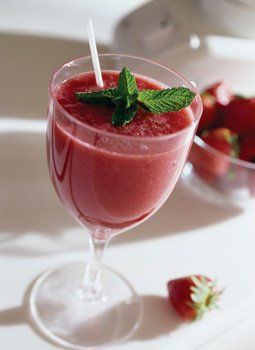How to Leverage the Advantages of Whey Protein in Beverages
As some of the most functional, versatile, and great-tasting ingredients derived from milk, whey ingredients are uniquely designed to function well in beverage applications. Whey is a nutritional powerhouse, containing the components of milk that remain soluble during the process of making cheese, which amounts to about half of the nutrients from milk.
As some of the most functional, versatile, and great-tasting ingredients derived from milk, whey ingredients are uniquely designed to function well in beverage applications. Whey is a nutritional powerhouse, containing the components of milk that remain soluble during the process of making cheese, which amounts to about half of the nutrients from milk.
Most whey ingredients are derived from sweet whey, which results from the manufacture of cheeses such as cheddar or mozzarella. Sweet whey, which is spray-dried to create the powdered ingredients, contains about 12% protein, 73% lactose, 3% fat, and 8% ash. Through the use of ultrafiltration and microfiltration, the proteins in whey can be concentrated to make higher-protein ingredients with less lactose, ash, and fat.

Whey protein concentrate WPC34 contains 34% protein, WPC80 contains 80% protein, and whey protein isolate (WPI) contains more than 90% protein. Depending on your beverage needs, there is a whey ingredient available with the composition to deliver the right functionality and nutrition-along with a clean, neutral flavor.
Whey proteins have the ability to remain soluble in a wide pH range, from pH 2 to 10. This high level of solubility is extremely important for beverage applications. Good solubility in the acid pH range is where whey ingredients excel.
Beverage solubility and stability can be maintained up to the addition of 7% whey protein. If clarity is an important attribute for your beverage, a WPI added to a beverage at pH 3.0 to 3.2 will provide the best clarity. If clarity is not an important attribute of your beverage, a smoothie-type beverage fortified with a WPC80 or WPI typically in the pH range of 3.5 to 4.0 can be a refreshing alternative. Smoothies often incorporate juice into the formulation, so this pH range is better suited for fruit juices. At this higher pH range, stabilizers like pectin are often needed at protein levels of 5% and above to protect the protein and maintain long-term beverage stability.
POTENTIAL USE OF DAIRY INGREDIENTS
Meal-replacement drinks are often found in the neutral pH range of 6.5 to 7.0. These drinks are often exposed to high heat treatments to provide better shelf stability. WPC80 and WPI can be used in combination with milk protein concentrate or nonfat dry milk to provide additional protein up to a total protein content of 7%. Stabilizers and buffers are used to protect the proteins and maintain good beverage stability. WPC80 and WPI provide excellent solubility, stability, mouthfeel, and flavor in any protein-fortified drink.
Not only do whey proteins provide a good source of functional protein, they also bring added nutritional value to any beverage. Whey proteins are an excellent source of protein, containing all of the essential amino acids in the proportions that the body requires for good health.
Whey proteins contain a high level of the branched-chain amino acids leucine, isoleucine, and valine. Muscle metabolizes the branched-chain amino acids so they are readily available for muscle building and muscle recovery after strenuous exercise.
Additionally, the branched-chain amino acids have been linked to preserving muscle mass-an important benefit-especially when dieting for weight management.
Preliminary studies show hydrolyzed whey protein may offer advantages in lowering high blood pressure. There are also some suggestions that whey proteins protect against infections and viruses.
Look to whey protein for a complete package of functional and nutritional benefits in beverages.
Kimberlee (K.J.) Burrington is whey applications coordinator at the Wisconsin Center for Dairy Research at the University of Wisconsin–Madison, one of six dairy research centers and two dairy applications labs supported by Dairy Management Inc. (Rosemont, IL).
"






